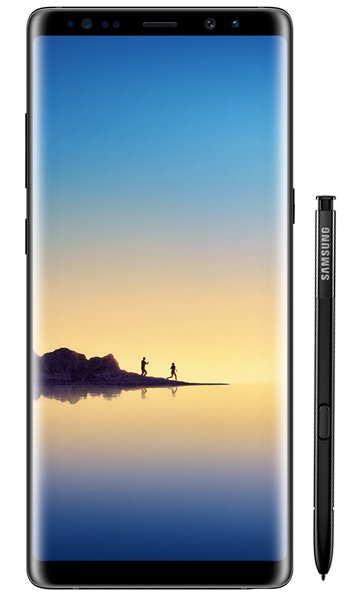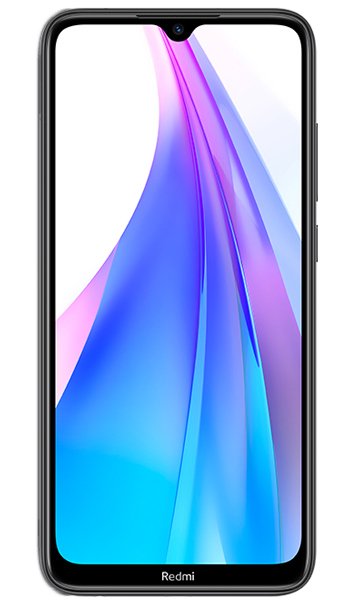Samsung Galaxy Note 8 vs Xiaomi Redmi Note 8T Comparison and Differences
Smartphone 1

Samsung Galaxy Note 8
Smartphone 2

Xiaomi Redmi Note 8T
Smartphone 3
Samsung Galaxy Note 8 or Xiaomi Redmi Note 8T Specs Comparison
or
 Common specs
Common specs
| Brand and model | Samsung Galaxy Note 8 | Xiaomi Redmi Note 8T | |
| Rating | (+) | (+) | |
| Release date | 2017, August | 2019, November | |
| Dimensions (HxWxD) | 162.5 x 74.8 x 8.6 mm | 6.4 x 6.4 x 2.94 in | 161.1 x 75.4 x 8.6 mm | 6.34 x 6.34 x 2.97 in | |
| Weight | 195 g | 6.88 oz | 200 g | 7.05 oz | |
| Body Build | Front/back glass (Gorilla Glass 5), aluminum frame | Front/back glass (Gorilla Glass 5) | |
| Case | buy from Amazon | buy from Amazon | |
| Colors | Midnight Black, Maple Gold, Orchid Gray, Deep Sea Blue, Star Pink (Taiwan only) | Stellar blue, Moon white, Midnight gray | |
| Battery | 3300 mAh, Non-removable Li-Ion | 4000 mAh, Non-removable Li-Po | |
| Battery life |
Talking time - Up to 22 h (3G) Music play - Up to 74 h |
||
| Approximate price | 550 EUR | 180 EUR | |
| Check price | from Amazon | from Amazon |
 Screen
Screen
| Technology | Super AMOLED | IPS LCD | |
| Touchscreen | capacitive touchscreen | capacitive touchscreen | |
| Display colors | 16M | 16M | |
| Screen size | 6.3" in | 6.3" in | |
| Screen area | 101.1 cm2 | 97.4 cm2 | |
| Screen format | 18.5:9 (height:width) | 19.5:9 (height:width) | |
| Screen to body ratio | 83.2% | 80.2% | |
| Screen resolution | 1440 x 2960 px | 1080 x 2340 px | |
| Screen PPI /points per inch/ | 521 PPI | 409 PPI | |
| Screen protection | Corning Gorilla Glass 5 | Corning Gorilla Glass 5 | |
| Other specs | - HDR10 -3D Touch (home button only) -Always-on display |
||
| Screen protector | buy from Amazon | buy from Amazon |
 Camera and Video
Camera and Video
| Rear camera, main | 12 MP, Dual | 48 MP, Quad | |
| Camera specs | -12 MP, f/1.7, 26mm (wide), 1/2.55'', 1.4µm, dual pixel PDAF, OIS -12 MP, f/2.4, 52mm (telephoto), 1/3.6'', 1.0µm, AF, OIS, 2x optical zoom |
-48 MP, f/1.8, 26mm (wide), 1/2'', 0.8µm, PDAF -8 MP, f/2.2, 13mm (ultrawide), 1/4'', 1.12µm -2 MP, f/2.4, 1/5'', 1.75µm (dedicated macro camera) -2 MP, f/2.4, 1/5'', 1.75µm, depth sensor |
|
| Functions | LED flash, auto-HDR, panorama | LED flash, HDR, panorama | |
| Video | 2160p@30fps, 1080p@60fps, 720p@240fps, HDR, dual-video rec. | 2160p@30fps, 1080p@30/60/120fps, gyro-EIS | |
| DxOMark Main Score | 94 | ||
| DxOMark Photo | 100 | ||
| DxOMark Video | 84 | ||
| Front camera, selfie | 8 MP, Single | 13 MP, Single | |
| Specifications | 8 MP, f/1.7, 25mm (wide), 1/3.6'', 1.22µm, AF | 13 MP, f/2.0, 1.12µm | |
| Functions | Dual video call, Auto-HDR | HDR, panorama | |
| Video | 1440p@30fps | 1080p@30fps |
 Performance
Performance
| Operating system - OS | Android 7.1.1 (Nougat), upgradable to Android 8.0 (Oreo) | Android 9.0 (Pie); MIUI 10 | |
| Chipset | - Exynos 8895 Octa (10 nm) - Qualcomm MSM8998 Snapdragon 835 (10 nm) - USA & China |
- Qualcomm SM6125 Snapdragon 665 (11 nm) | |
| CPU | - Octa-core (4x2.3 GHz Mongoose M2 & 4x1.7 GHz Cortex-A53) - EMEA -Octa-core (4x2.35 GHz Kryo & 4x1.9 GHz Kryo) - USA & China |
- Octa-core (4x2.0 GHz Kryo 260 Gold & 4x1.8 GHz Kryo 260 Silver) | |
| GPU | Mali-G71 MP20 - EMEA Adreno 540 - USA & China |
Adreno 610 | |
| External memory | microSD, up to 512 GB (uses SIM 2 slot) - dual SIM model only | microSD, up to 256 GB (dedicated slot) | |
| Internal memory | 64/128/256 GB, 6 GB RAM | 32GB 3GB RAM, 64GB 4GB RAM, 128GB 4GB RAM |
 Benchmark
Benchmark
| Antutu 9 Total | 190000 | ||
| Antutu 8 Total | 259278 | 173792 | |
| Antutu 7 Total | |||
| GeekBench 6 Single Core | 367 | 325 | |
| GeekBench 6 Multi Core | 1327 | 1048 | |
| GeekBench 6 OpenCL | 1318 | 293 | |
| GeekBench 6 Vulkan | 554 | 476 | |
| GeekBench 5 Single Core | 345 | 313 | |
| GeekBench 5 Multi-Core | 1509 | 1398 | |
| GeekBench 4 Single Core | 1792 | ||
| GeekBench 4 Multi-Core | 6277 | ||
| GeekBench 4 RenderScript | 9051 | ||
| GeekBench 4 Battery | 3822 |
 Communication and Connectivity
Communication and Connectivity
| SIM card | Single SIM (Nano-SIM)Hybrid Dual SIM (Nano-SIM, dual stand-by) | Dual SIM (Nano-SIM, dual stand-by) | |
| Network | GSM / HSPA / LTE | GSM / HSPA / LTE | |
| Bands | -2G - GSM 850 / 900 / 1800 / 1900 - SIM 1 & SIM 2 (dual-SIM model only) -3G - HSDPA 850 / 900 / 1700(AWS) / 1900 / 2100 -4G - LTE band 1(2100), 2(1900), 3(1800), 4(1700/2100), 5(850), 7(2600), 8(900), 12(700), 13(700), 17(700), 18(800), 19(800), 20(800), 25(1900), 26(850), 28(700), 32(1500), 38(2600), 39(1900), 40(2300), 41(2500), 66(1700/2100) |
-2G - GSM 850 / 900 / 1800 / 1900 - SIM 1 & SIM 2 -3G - HSDPA 850 / 900 / 1700(AWS) / 1900 / 2100 -4G - LTE band 1(2100), 2(1900), 3(1800), 4(1700/2100), 5(850), 7(2600), 8(900), 20(800), 28(700), 38(2600), 40(2300) |
|
| Speed | HSPA 42.2/5.76 Mbps, LTE-A (5CA) Cat16 1024/150 Mbps | HSPA 42.2/11.5 Mbps, LTE-A | |
| GPRS | Yes | Yes | |
| Edge | Yes | Yes | |
| Wi-Fi | Wi-Fi 802.11 a/b/g/n/ac, dual-band, Wi-Fi Direct, hotspot | Wi-Fi 802.11 a/b/g/n/ac, dual-band, Wi-Fi Direct, hotspot | |
| GPS | Yes, with A-GPS, GLONASS, BDS, GALILEO | Yes, with A-GPS, GLONASS, BDS | |
| NFC | Yes | Yes | |
| USB | 3.1, Type-C 1.0 reversible connector | 2.0, Type-C 1.0 reversible connector, USB On-The-Go | |
| Bluetooth | 5.0, A2DP, LE, aptX | 4.2, A2DP, LE |
 Music and Audio
Music and Audio
| Radio | No | FM radio | |
| Headphone jack | Yes | Yes | |
| Others | - 32-bit/384kHz audio -Active noise cancellation with dedicated mic |
 Other features
Other features
| Sensors | - Iris scanner, fingerprint (rear-mounted), accelerometer, gyro, proximity, compass, barometer, heart rate, SpO2 | - Fingerprint (rear-mounted), accelerometer, gyro, proximity, compass , Infrared port | |
| Other extras |
- Samsung DeX (desktop experience support) -ANT+ -Bixby natural language commands and dictation - Fast battery charging (Quick Charge 2.0) -Qi/PMA wireless charging (market dependent) - Samsung Pay (Visa, MasterCard certified) -IP68 dust/water proof (up to 1.5m for 30 mins) -Stylus |
- Fast battery charging 18W |
|
| Versions |
- Versions: N950F (Single SIM: Europe, Australia); N950FD (Global Dual SIM: Europe, LATAM, Brazil; Australia); N950U/U1 (USA); N950W (Canada); N9500 (China); N950N (South Korea) Also known as Samsung Ga |
Reviews and Opinions on Samsung Galaxy Note 8 and Xiaomi Redmi Note 8T
If you had to recommend one of these phones to a friend, which one would it be and why? Share your arguments using the Add Opinion button!
